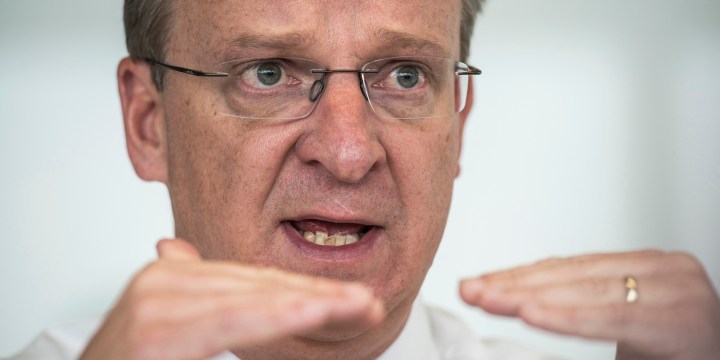CAREER HIGHLIGHTS
Outgoing Nedbank CEO Mike Brown has done a good job of reducing the pile in his successor’s in-tray

The chief executive, who has been with the financial services group for three decades and is retiring at the end of next month, will leave behind a bank whose repositioning has started paying off.
Mike Brown is retiring from Nedbank, where he has been CEO for a decade, on his 58th birthday on 31 May, and the obvious question is what he intends to do now. That elicits a non-obvious response: “Nothing.”
His understandable justification for an opportunity to work on his golf is that he has been CEO for a decade, but also chief financial officer before that and a Nedbank employee for 30 years. Being a CEO in South Africa is very hard; being a CEO of a bank in South Africa is very hard and being the CEO of Nedbank was no walk in the park either. He really wants a break. And he does have a two-year restraint of trade.
It is incredible to look back over Nedbank’s past decade. In some ways, being CEO of Nedbank has been an exercise in trying to keep a level head while on a roller-coaster ride. In an interview, Brown said he could really point to five main highlights.
First, the overall state of the bank is solid, and he will be handing over to former Absa group financial director Jason Quinn an organisation that is overall in good health, with a unique set of values and culture. Like SA’s other banks, Nedbank is an enormous organisation, with just more than 30,000 employees and just over 500 branches. Nedbank’s share price has not performed well over the past decade, similar to SA’s other banks, but has bounced back from the Covid decline solidly, slightly better than its competitors. The bank is trading at multiples slightly better than, or very close to, its main competitors – which was not always the case.
The second highlight for Brown was managing the split from Old Mutual and the possible acquisition by international bank HSBC. In about 2010, Old Mutual, a majority shareholder of Nedbank for decades, decided it wanted to sell its stake and HSBC emerged as the preferred purchaser. The HSBC purchase never happened because of a change of leadership at HSBC, but ultimately, in 2018, Old Mutual unbundled its stake to Old Mutual shareholders.
“And effectively, Nedbank has emerged now with both the responsibility but also the privilege of being an independent entity determining its own strategy and its own future,” says Brown.
Repositioning
The third highlight was about repositioning Nedbank. Brown says if you looked at the Nedbank of 2010, what you would have seen was a strong wholesale franchise in the corporate and investment banking businesses, but a weaker retail franchise.
“In about 2015, we decided that one of the key foundations was to improve the competitive strength of our retail franchise, and that required a complete refresh of our tech stack.”
That project had to be as good as anything in the world and as good as anything that the new “fintechs” had to offer. That project is now about 95% done, and it delivered materially on time, on scope and on budget.
The changes are now beginning to become visible in the retail franchise, and for the past two years Nedbank has been first in something called the “net promoter scores”, which are a survey of whether customers would recommend the bank to others. There has been strong growth in the Nedbank money app, and very strong growth in Avo, which is the platform to connect buyers and sellers. There has also been growth in main bank customers. The bank has created a “foundation for digital leadership”, he says.
The fourth highlight was about brand image. Nedbank had for many years, “long before my time”, says Brown, a brand image associated with sustainability and the environment. That goes back to former CEOs Richard Laubscher and Tom Boardman. “Really what we’ve tried to do in the past 10 years is take that foundation and turn it into ESG leadership.”
The fifth highlight was returning earnings to 2019 levels, the pre-Covid high watermark, and to get the return on equity (ROE) back above 15%.
Lowlights
Well, what about the lowlights? There were certainly some of those, Brown says. Most important among those was dealing with the Covid crisis, particularly in the second quarter of 2020. Brown was also head of the banking association at the time, and everybody was fixated that this health crisis would turn into a financial crisis, which would turn into a banking crisis, and all the banks would be in trouble.
“[It was difficult] trying to protect your own staff but also [needing] your own staff to be helping customers who were going through the most difficult periods in their lives, entirely not of their own doing …
“I think we came out of it really well, but it was definitely the toughest period of 30 years in banking, way tougher than the global financial crisis.”
The accusations that Nedbank was at least a cooperating party in State Capture, because of its transactional relationship with Regiments Capital, were another lowlight. Brown believes that if various state-owned enterprises appointed Regiments as their adviser, and if any transactions emanated from those appointments that were tainted by corruption, “it was corruption at the state-owned enterprises and Regiments that Nedbank was completely unaware of”. Aspects of the case are still under investigation by the Special Investigating Unit.
I suggest to Brown that the emergence of three new banks, Bank Zero, Discovery Bank and TymeBank, during his term might also be considered a lowlight. Did the established banks miss a trick here?
Brown is philosophical about it. “If you believe in the power of markets and capitalism, this is exactly what should happen over time. New competitors emerge. They make life difficult for incumbents. Incumbents have to improve their businesses. And in the round, as a consequence of all of that, actually consumers are better off.”
Future of Nedbank
What about the future of Nedbank and its prospects for expansion and growth, particularly on the African continent? “It’s certainly something that Nedbank continues to wrestle with strategically. So we don’t claim to have all of the answers here, but it is my view, and I may be proved to be wrong over time, that currently many of the banks in the rest of Africa are overearning relative to a more normalised level of earnings.
“We want Nedbank to be present as Nedbank in countries in Africa that have strong strategic relationships among each other and with South Africa.” This, he said, was really the new trend internationally; the days of big banks sticking flags in the map are over. Where there is expansion, the question is whether there is some kind of economic underpin or linkage.
How do others see Brown’s term in office? The broad answer is good, with some caveats. Nedbank is “buy” rated by almost all banking analysts. Harry Botha, banking analyst at Anchor Stockbrokers, says Brown is “very smart and communicates well”.
“He did a good job to steady the group after the global financial crisis and the problems from aggressive growth in the late ’90s and early 2000s.
“The greatest concern is probably that he didn’t act sooner to improve the competitiveness of the South African retail operations, which is the biggest drag on ROE compared with peers. A lot of it was related to technology, which Nedbank probably couldn’t have completed successfully – largely on time and on budget – any sooner if you consider Standard Bank’s problems. It probably started the technology transition four to five years before Nedbank.
“However, Nedbank probably could have acted sooner in the retail bank to improve cross-sell, like peers were achieving without modern systems, break down product silos and create the appropriate divisional and product level management incentives, like the FNB model.”
A lack of regional diversification stands out for Nedbank, but in hindsight it’s tough to judge and view it negatively, given the selective success of South African companies outside South Africa.
When you take this all into account, there is a lot in Quinn’s in-tray, but he has Brown to thank for a huge amount that’s not there. DM
This article first appeared in our weekly Daily Maverick newspaper, DM168, which is available countrywide for R35.




















Rather a sycophantic and non-inquisitive commentary.
Brown has been CFO and then CEO of Nedbank over the State Capture period where and when the bank has been named in the Zondo findings and was also the local representative and authorised dealer for Baroda Bank-implicated in the Gupta scandal and expatriation of hundreds of millions.
Aided by the Banking Council ( with Nedbank as one of its senior members) none have made the full and open disclosures which should rightfully be expected and demanded.
State and other corruption continues unabated with massive questionable money flows taking place.
In combination with limp-wristed reporting and interrogation by the FIC and SARB, the SA banking sector has failed in its duty of compliance and guardianship.